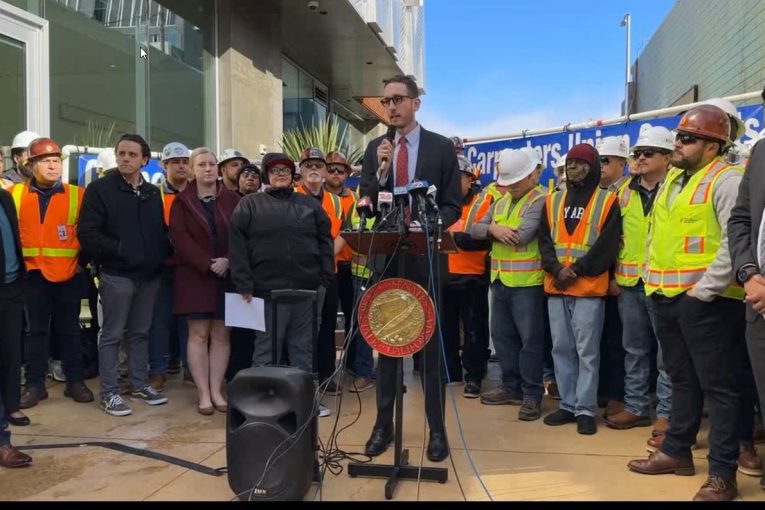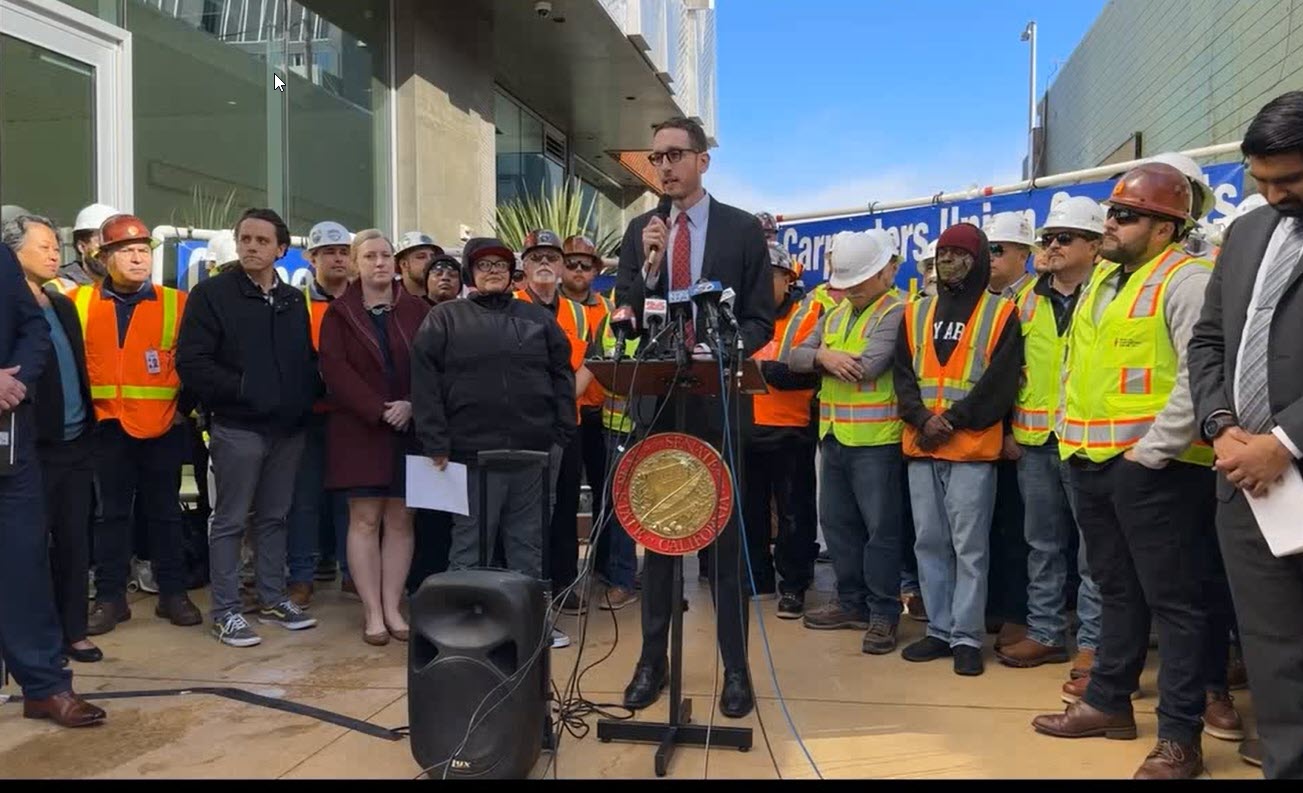

By David M. Greenwald
Executive Editor
San Francisco, CA – On Monday, Senator Scott Wiener held a press conference in San Francisco to announce the introduction of SB 423, which would extend and strengthen existing law streamlining and accelerating housing permits in areas that underperform their housing targets.
Among other things, SB 423 removes the sunset of SB 35, which is set to expire at the end of 2025. It also expands that law’s ability to deliver mixed-income housing developments and broadly benefit construction workers through changes to SB 35’s labor provisions.
Senator Wiener explained that, according to data from UC Berkeley’s Terner Center, they found that in the first four years the bill was in effect, 18,000 units of housing have either been approved or are in the process of being approved under SB 35, and “three-quarters of those units, are below market rate.
“We are desperately in need of new homes in California. We are short millions of homes,” Senator Wiener said. He added, “SB 35 is a good government measure that will allow us to accelerate home construction. It’s very simple. If you meet all the rules, you meet the zoning and setbacks and designs and everything else, you, you get your permit without a hyper-politicized, chaotic, process that can take years, uh, and lead to  litigation because anyone who has an attorney can challenge you.”
litigation because anyone who has an attorney can challenge you.”
San Francisco Mayor London Breed was scheduled to join the press conference but had a scheduling conflict.
In a statement she argued, “SB 35 is an essential tool for streamlining housing in California.”
Senator Wiener noted that in San Francisco nearly 2,000 units, of which 93% were affordable, have been added under SB 35, according to the San Francisco Planning Department. More than 1,000 more homes are in the San Francisco SB 35 pipeline.
Mayor Breed said, “It has helped San Francisco build affordable housing projects quickly in neighborhoods across the City, and more importantly, it has helped us to create safe homes for people who need them.”
California YIMBY CEO Brian Hamlin noted that his organization “works to make California affordable for everyone to live, work, and raise a family” and called SB 35 “one of the most powerful pro-housing laws of modern California history.”
He said, “SB 35 has led to the development of thousands of homes affordable to low income Californians across our state, along with good paying jobs for construction workers, including some of the men and women behind me today. By streamlining the approval of affordable housing, SB 35 makes it faster, cheaper, and easier for low income housing developers to deliver the homes we need in our cities and towns while creating good jobs in our communities.”
Hamlin added, “California needs millions of new homes for people of all incomes, at all stages of life.” He said, “I am confident that when the legislature passes thius bill, and the governor signs it into law, that SB 423 will turbocharge the construction of mixed-income housing, just as SB 35 did for subsidized affordable housing.
According to a release from Senator Wiener’s office, SB 35 works by granting streamlined approval—also known as ministerial approval—to certain housing projects proposed in areas that are out of compliance with the state’s housing planning process, RHNA.
These projects are granted ministerial review, which means that CEQA does not apply and cities are prohibited from applying discretionary processes.
For projects that are covered by SB 35, permits must be issued in 3-6 months, depending on the size of the project.
To qualify for SB 35, projects must be:
- Multi-family (at least 2 units)
- Located on an infill site
- Comply with objective zoning and design standards,
- Meet minimum affordability requirements, and
- Meet other locational and demolition restrictions.
“The degree of noncompliance determines what projects are granted streamlined, ministerial review under SB 35,” Senator Wiener’s office noted..”If a local government fails to submit their latest required Annual Progress Report, or they fail to permit their share of above-moderate income units, then projects get streamlined approval if 10% of units are affordable to lower-income households earning below 80% of AMI. If they meet their above-market-rate goals but fail to permit their share of lower-income and very low-income units, projects get streamlined approval if 50% of the proposed units are affordable to lower-income households earning below 80% of AMI.”
Under these conditions, SB 35 requires a city to issue a permit for a project that complies with zoning and design standards.
It also removes these projects from discretionary local permitting and CEQA—often a lengthy, chaotic, and highly politicized process that can kill projects that comply with all relevant standards.
“SB 35 thus brings much needed certainty to the housing approval process,” a release noted.
Further, SB 35 caps the ministerial approval process at 6 months, “which has revolutionized housing permitting processes across the state that once took years to run their course.”
For example, researchers at UC Berkeley found that because of SB 35, Mercy Housing California was able to develop Tahanan (833 Bryant St. in San Francisco) 30 percent faster and at 25 percent less cost per unit than a similar, non-SB 35 project. By creating new units of housing on a rapid timeline, “they also estimated that 145 unhoused people would be housed months or even years sooner than if the project had been developed through the typical processes – a prediction borne out by the efficient construction process.”
Wiener’s office adds, “SB 35 was intended to spur the development of both affordable and mixed-income projects. However, the majority of projects that have been developed under SB 35 have been 100% affordable projects.”
SB 423 extends and builds on SB 35’s success. It removes the sunset on SB 35, thus allowing the bill to continue facilitating new housing past 2025.
SB 423 also delivers on SB 35’s promise of mixed-income housing development by amending the labor provisions of the law. Under SB 423, contractors must pay prevailing wage to any project of 11 or more units. The bill also requires that SB 35 projects of at least 50 units offer employment opportunities to state-registered apprentices and provide health insurance to construction workers and their dependents.
These protections mirror those signed into law under last year’s AB 2011, by Assemblymember Buffy Wicks, which streamlines conversion of commercial property to housing. SB 423 extends labor protections to the hundreds of thousands of residential construction workers in California who currently work in the shadows with no protections at all.
Over 80% of California’s residential construction workers identify as Latino, and the vast majority rely on Medi-Cal and over-subscribed housing programs. Nearly half receive some form of public assistance.


I fully support all of the provisions of SB 423. I sincerely wish swift approval of this essential tool to greatly speed up the construction of affordable housing in California. ?
It would be nice if the City of Davis were proactive in pursuing funding for 100% Affordable housing.
It would also be helpful to our community’s housing situation if UCD pursued and built Affordable housing on campus.
It would be useful to know what proportion of UCD on campus housing fits the HCD housing affordability metrics. The Vanguard should seek that data … both current and historical.